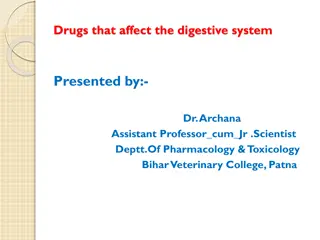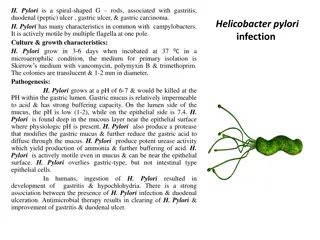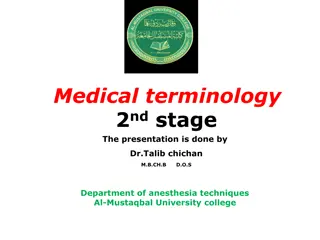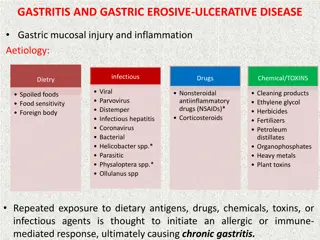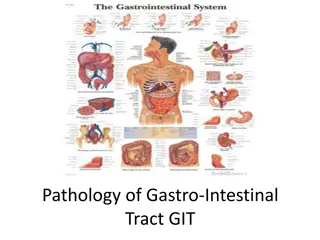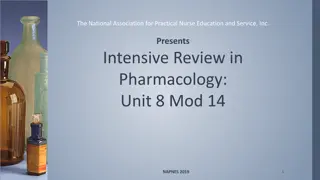GASTRITIS
Gastritis refers to inflammation of the gastric mucosa and can be classified into various types like autoimmune gastritis, H. pylori gastritis, erosive gastritis, lymphocytic gastritis, and peptic ulceration. Each type presents unique characteristics, causes, and potential complications, including gastric cancer. Proper understanding of gastritis is crucial for accurate diagnosis and effective management.
Download Presentation

Please find below an Image/Link to download the presentation.
The content on the website is provided AS IS for your information and personal use only. It may not be sold, licensed, or shared on other websites without obtaining consent from the author.If you encounter any issues during the download, it is possible that the publisher has removed the file from their server.
You are allowed to download the files provided on this website for personal or commercial use, subject to the condition that they are used lawfully. All files are the property of their respective owners.
The content on the website is provided AS IS for your information and personal use only. It may not be sold, licensed, or shared on other websites without obtaining consent from the author.
E N D
Presentation Transcript
Classification of gastritis Gastritis describes any histologically confirmed inflammation of the gastric mucosa. In most modern classification systems the amount of inflammatory infiltrate and the degree of gastric atrophy will be included.
Autoimmune gastritis There are circulating antibodies to the parietal cell. This results in the atrophy of the parietal cell mass hypochlorhydria or achlorhydria. Decease in intrinsic factor. Malabsorption of vitamin B12, may result in pernicious anemia. The antrum is not affected and the hypochlorhydria leads to the production of high levels of gastrin from the antral G cells. This results in chronic hypergastrinaemia. Patients with autoimmune gastritis are predisposed to the development of gastric cancer, and screening such patients endoscopically may be appropriate.
H. pylori gastritis (Type B gastritis) This affects the antrum, and it is these patients who are prone to peptic ulcer disease. Most prone to the development of gastric cancer. Intestinal metaplasia is associated with chronic pangastritis with atrophy. Reflux gastritis This is caused by enterogastric reflux and is particularly common after gastric surgery. Operation for the condition should be reserved for the most severe cases.
Erosive gastritis Caused by agents that disturb the gastric mucosal barrier; NSAIDs and alcohol are common causes. Stress gastritis A common sequel of serious illness or injury and is characterized by a reduction in the blood supply to superficial mucosa of the stomach. The condition also cardiopulmonary bypass. Prevention: routine use of H2 antagonists with or without barrier agents, such as sucralfate, in patients who are on intensive care. sometimes follows
Lymphocytic gastritis This type of gastritis is seen rarely. It is characterized by infiltration of the gastric mucosa by T cells and is associated with H. pylori infection. The pattern of inflammation resembles that seen in coeliac disease or lymphocytic colitis.
Peptic ulceration Caused by H. pylori or NSAIDs . Duodenal ulcers are more common than gastric ulcers, but the symptoms are indistinguishable Gastric ulcers may become malignant and an ulcerated gastric cancer may mimic a benign ulcer. Gastric antisecretory agents and H. pylori eradication therapy are the mainstay of treatment, and elective surgery is very rarely performed The common complications of peptic ulcers are perforation, bleeding and stenosis The treatment of the perforated peptic ulcer is primarily surgical, some patients may be managed conservatively Cigarette smoking predisposes to peptic ulceration and increases the relapse rate after treatment.
Gastric cancer One of the most common causes of cancer death in the world The outlook is generally poor, owing to the advanced stage of the tumor at presentation The etiology of gastric cancer is multifactorial, but H. pylori is important factor for distal but not proximal gastric cancer. Early gastric cancer is associated with very high cure rates. Gastric cancer can be classified into intestinal and diffuse types, the latter having a worse prognosis Spread: lymphatics, blood or direct, but distant metastases are uncommon in the absence of lymph node involvement. The treatment of curable cases is by radical surgery and removal of the second group of lymph nodes. Gastric cancer is chemosensitive and chemotherapy improves survival in patients having surgery for the condition and in advanced disease


